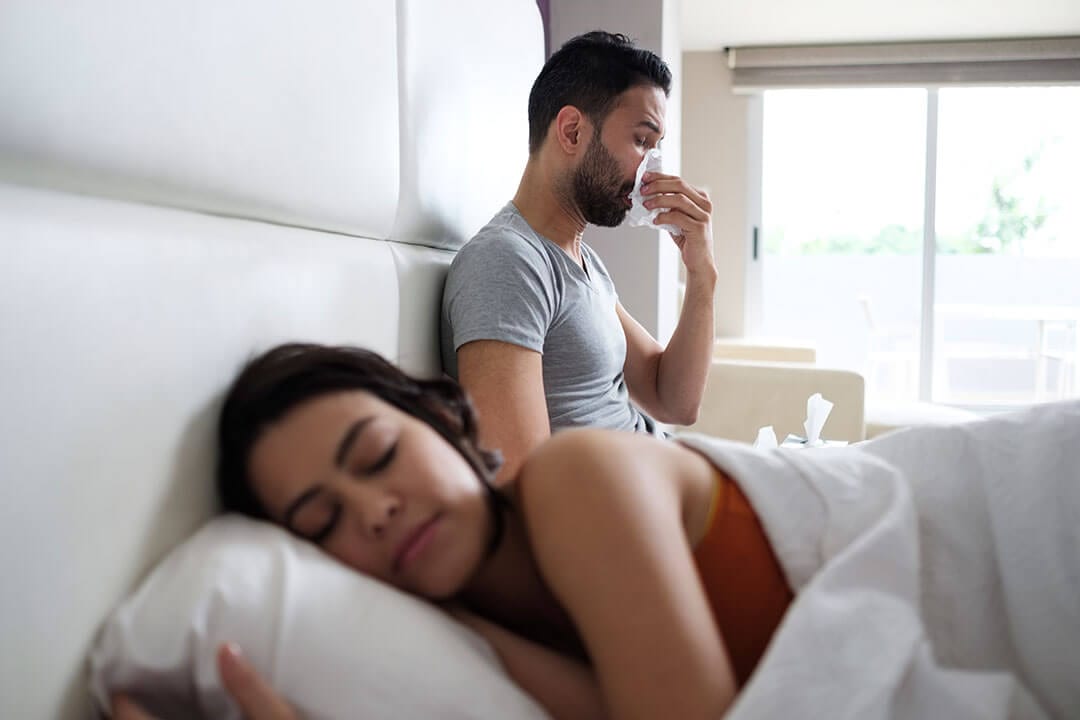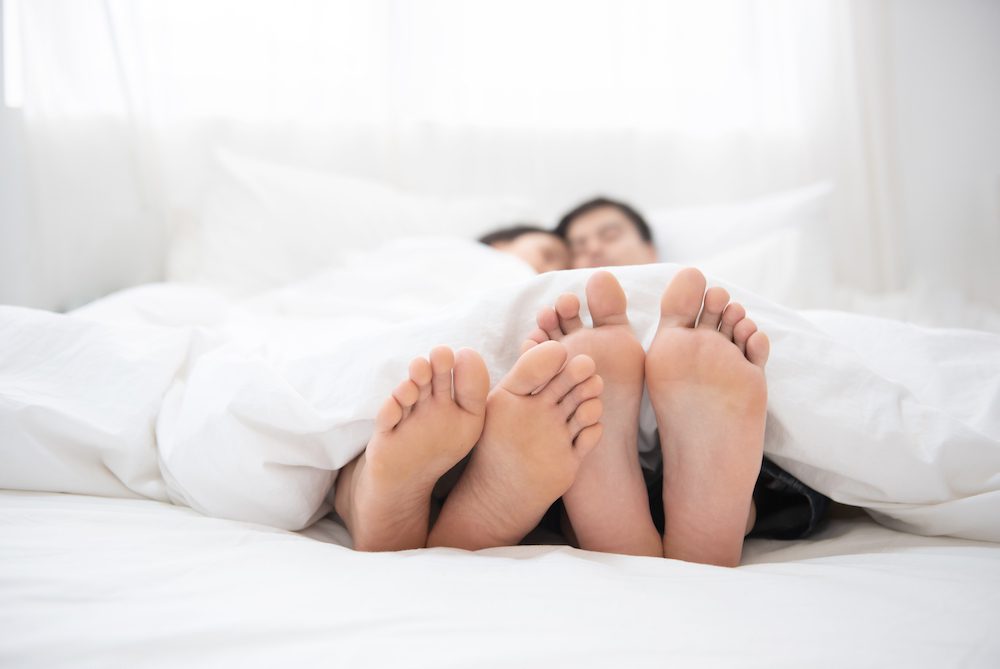If nighttime trips to the bathroom are preventing you from getting a good night’s sleep, you are not alone. As many as 50 million people in the U.S. have nocturia, a bothersome condition characterized by the frequent need to urinate during the night.
Nocturia can be an inconvenience, but it is also a major cause of interrupted sleep and can impact your daytime functioning and overall health. We explore the possible causes of nocturia and suggest ways you may be able to reduce urination at night so you can get a fuller night’s rest.
Key Takeaways
- Nocturia, or frequent urination at night, increases likelihood with age and periods of hormonal changes, like pregnancy and menopause.
- Common causes include fluids before bed, underlying medical conditions, and medications.
- Nocturia can repeatedly disrupt the sleep cycle, impacting your sleep quality and next-day wakefulness.
- Manage fluid intake, avoid certain substances, and seek medical advice to reduce nighttime bathroom trips.
What Is Nocturia?
Nocturia is the need to get up to urinate at night. Technically, nocturia is defined as waking up at least once to urinate. But doctors explain that getting up to urinate just once during the night is usually not problematic. It’s when the urge to urinate wakes you from sleep twice or more a night that nocturia can become a problem.
Because the bladder makes less urine at night, most people can sleep for six or more hours without getting up to urinate. But a third of all people over 30 years old have to go to the bathroom at least twice each night, which can disrupt their sleep considerably.
Doctors describe nocturia as a symptom of other conditions, not a disease itself. However, nocturia can offer a clue to underlying medical conditions, including heart disease, kidney disease, and sleep disorders.
Who Is Commonly Affected by Nocturia?
Although not all older people have to get up at night to urinate, nocturia does become more common as people age. In fact, around half of all people ages 50 to 79 wake up at least once a night to use the bathroom.
Among people aged 18 to 49, nocturia is more prevalent in women and people assigned female at birth. Nocturia in this group may be caused by hormonal changes, such as those that happen during pregnancy or menopause. Nocturia due to pregnancy usually goes away within three months of giving birth.
However, research suggests that by age 60, nocturia is more common in men and people assigned male at birth. Medical experts believe this is often related to prostate issues that can develop over time.
The majority of people who have nocturia have an overactive bladder, giving them excessive urges to urinate during the day as well as at night. Certain groups of people, including those who are Black or Hispanic, are also more likely to experience nocturia.
Why is Going to the Bathroom So Much at Night a Problem?
If you’re waking up to pee several times a night, you’re likely not getting the sleep your body and mind needs to be at their best. I’ve often discussed the link between sleep deprivation and mental health, as well as physical health–but it’s especially true here.
Frequent nighttime awakenings, regardless of the cause, cause a disruption in your sleep cycles. Our body is supposed to transition through four stages of sleep per night, but what happens with frequent awakenings is you may only barely, or never quite reach slow-wave non-REM and REM sleep.
Slow-wave, or deep sleep, is responsible for producing growth hormones, tissue repair, and synaptic plasticity (in other words, our brain’s ability to process and store information). REM, the sleep stage where we experience intense dreams, regulates mood, learning, and memory.
How Can Nocturia Impact You?
Waking up from sleep to use the bathroom can make it difficult to get the sleep you need. Experts say that if you are waking up two or more times at night to urinate, you are likely experiencing major disruptions to your sleep cycle that can impact your daytime function and quality of life.
Most of the time, people with nocturia wake up to use the bathroom within the first two to four hours of sleep. In fact, very few people with nocturia are able to sleep more than two or three hours before waking up to go to the bathroom. This first half of the night is a critical time for deep sleep, which may explain why people with nocturia might not feel refreshed the next day.
One of the biggest challenges people face when they wake at night to go to the bathroom is falling back asleep. Some research shows that more than 40% of people find it hard to get back to sleep after a nighttime trip to the bathroom. This means they have fragmented sleep and less overall sleep time, which can ultimately lead to chronic sleep deprivation.
You may also be feeling the impact of your nocturia during the day. Not getting enough sleep at night can cause daytime sleepiness or fatigue, which can lead to changes in mood, difficulty with daily tasks, and trouble concentrating and learning. Moreover, nocturia is believed to be associated with depression, weight gain, heart disease, and diabetes.
Some studies have explored the impact of nocturia on certain groups of people. For example, in women and people assigned female at birth, nocturia can interfere with their professional and household duties, as well as their exercise habits and sex lives. In older people who may rush to the bathroom in the dark, nocturia may increase the risk of falling and breaking a bone.
And it’s not only the person with nocturia who may have to cope with sleep deprivation. Their repeated bathroom trips can also keep their bed partner from getting sufficient sleep.
What Causes Nocturia?
There are several causes of frequent nighttime urination. One common cause is drinking too much water or other fluids before bedtime. Feeling stressed or anxious may also provoke nocturia. In addition, certain medications, including diuretics or water pills, can make you urinate more at night.
Research has also found that several health conditions may contribute to nocturia, such as:
- Bladder or urinary tract infections
- Enlarged prostate gland
- Diabetes
- Kidney failure
- Heart disease
In addition to these possible contributing factors, nocturia can be the result of an overproduction of urine, problems with bladder storage, and sleep disorders.
Overproduction of Urine at Night
The way the body produces urine can play a role in how often people get up at night to urinate. For example, one of the most common causes of nocturia is a condition called nocturnal polyuria, in which the body produces more urine at night than during the day.
Nocturnal polyuria is more likely to be the cause of nocturia in older people. This may be due to hormonal changes related to aging that can increase urine production during the night.
Overproduction of Urine All Day
Some people constantly overproduce urine throughout the day, not just at night. This is called global polyuria and can be related to a high intake of water or other fluids over the course of the day. It may also be a sign of an untreated medical condition, such as diabetes.
Bladder Storage Issues
Some people have bladders that do not function correctly or that do not have the capacity to store enough urine, which may contribute to nocturia. These bladder problems are especially common in older people. Certain foods, medications, and dietary supplements can also affect bladder storage.
Sleep Disorders
Waking at night with the urge to urinate may also be connected to an underlying sleep disorder. For example, nocturia is very common in people with obstructive sleep apnea.
While many people point to their need to urinate as their reason for waking up at night, medical experts suspect that this is not often the true cause. Some research has shown that people with an underlying sleep disorder often mistakenly believe that their nighttime awakenings are caused by nocturia.
Fortunately, research indicates that nocturia may be relieved in people with a sleep disorder once the sleep issue is managed.
Treatment for Nocturia
It may be time to talk to your doctor if your symptoms are taking a toll on your everyday life. Treatment for nocturia usually focuses on the management of symptoms and reducing how often you wake up to use the bathroom each night.
Treatment also depends on the reasons behind your nocturia. If your symptoms are caused by a medical condition, your doctor will want to address that condition. Likewise, if a prescribed medication could be the culprit for your nighttime bathroom trips, your doctor may suggest changing the time you take the medication to minimize these side effects.
In general, doctors usually recommend a combination of exercises, lifestyle and behavioral changes, and medications to control nocturia.
How Can You Reduce Urination at Night?
There are several simple and safe strategies that may relieve your urge to urinate and help you sleep better at night.
- Limit Liquids Before Bedtime: Avoid drinking water or other beverages at night to reduce the need to wake up to urinate.
- Reduce Caffeine and Alcohol Intake: Caffeine can trigger the bladder to become overactive and produce too much urine. Reduce your intake of caffeine and alcoholic beverages later in the afternoon and evening.
- Talk to Your Doctor About When to Take Medications: Some medications, such as diuretics, can increase nighttime urination. Ask your doctor about the ideal time to take medications so they don’t interfere with your sleep.
- Strengthen Your Pelvic Floor: Doctors recommend pelvic floor muscle exercises to help strengthen key muscles and control your urinary symptoms.
- Elevate or Compress Your Legs: Some research has shown that you can reduce fluid buildup that leads to urination by elevating your legs or using compression socks before bedtime.
- Practice Good Sleep Hygiene: Healthy sleep hygiene can help you get better rest. Doctors recommend relaxing before bed, going to bed at the same time every night, and making sure your sleep environment is quiet, dark, and comfortable.
References
Ask the Sleep Doctor
Have questions about sleep? Submit them here! We use your questions to help us decide topics for articles, videos, and newsletters. We try to answer as many questions as possible. You can also send us an email. Please note, we cannot provide specific medical advice, and always recommend you contact your doctor for any medical matters.



